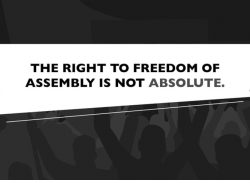Can freedom of assembly be limited?
Can the Nigerian government, police or authorities limit my right to assembly? What are the limitations to this right?

How can this right be limited?
The right to Freedom of assembly is not absolute. Various laws that seek to protect this right also lay down certain circumstances in which this right can be limited. These limitations are allowed by Section 45 (1) of the Nigerian Constitution and include:
- Public order
- Public morals
- Public safety
- Public health
- Protection of the rights and freedom of others
- National security
- Derogation in times of war or another public emergency
An example of limitation for the protection of public health is the COVID 19 pandemic, because of the pandemic, government laid down policies to reduce the transmission of the virus. These policies included the ban of gatherings above ten people as well as a ban on religious gatherings. These measures clearly restrict the individual’s right to freely assemble but is in line with the provisions of the law.
Similarly, an example of limitation in the interest of national security is the restriction of public gatherings in certain locations of the North-East in Nigeria in an effort to curb the insurgency and acts of terrorism. As a means to protect citizens, government made policies that tend to limit the right to freely assemble.
However, there are rules to how this right can be limited.
How does the law protect people in Nigeria from excessive limitations and breaches to freedom of assembly?
The limitations to freedom of assembly above must meet certain standards. These standards include:
The limitation must be justifiable in a democratic society: authoritarian restrictions or limitaitons without a justification on these specific limitations cannot limit the right to assemble. This is stated in Section 45 (1) of the Nigerian Constitution. This means that restrictions should first of all be the exception to the rule.
The limitation must be provided for by law: this means that the government cannot create a limitation if it is regulated in another form that is not a law, for example a policy, a regulation, an ordinance or a verbal order.
Hint: When the government limits freedom of assembly, a good response from the individuals and groups should be: Can the government tell us what law permits the government to do this?
This is stated in Article 11 of the African Charter. The law creating the restriction must:
- identify the circumstances when the restriction should be applied in a way that is specific and clear to allow people to know the limitation in advance how to act,
- not allow those restricting freedom of assembly discretion to choose how to limit it in a way that is not clear in the law,
- not allow other human right violations, and
- not make freedom of assembly the exception to the rule.
Anything not expressly forbidden in the law which outlines the restriction should therefore be presumed to be permissible.
The limitation must be necessary and proportionate: This is also stated in Article 11 of the African Charter. Restrictions must be applied only when there is a real need for it to meet the purposes above.
If manifestations of freedom of assembly is only a minor threat to national security, to public health or morals and to the reputation of others then it is not sufficient to be restricted. This means that restrictions must be used in special cases as a last resort.
Restrictions must also be proportionate to the goal they are set to achieve and be the least restrictive as possible to meet that goal. The restriction must also relate directly to the specific aim of the restriction. A specific aim cannot be used as an excuse to limit freedom assembly.
Hint: when there is a restrictive law, ask if the restriction is the least possible way that can be applied to the situation, and is there an alternative measure which would accomplish the same goal? For example, will completely banning a peaceful protest protect public order, or will allowing policing of the protest be enough?
What actions will be a violation of freedom of assembly?
Examples of limitations which breach freedom of assembly:
- Restricting the right to assemble not on any of the grounds for limitations permitted by law.
- Violently disrupting a peaceful protest or rally.
- Imposition of fines or penalties for conducting a peaceful assembly.
- Causing physical harm to peaceful protesters.
- Preventing the conduct of a peaceful assembly.
- Arresting or detaining a peaceful protester.
- Proposing laws that seek to restrict the right to assemble on any of the grounds for limitations permitted by law, but not being justifiable on a democratic society or not meeting the requirements of legality, necessity and proportionality.
This list is not exhaustive.